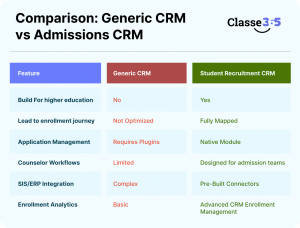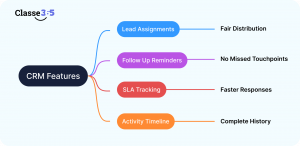Improving student recruitment today requires a modern, actionable approach, and this is exactly where admissions CRM tools and the best CRM for higher education make the biggest impact.
As student expectations evolve across digital channels, institutions need a centralized CRM enrollment management system that streamlines communication, supports application workflows, and improves overall recruitment efficiency. A student recruitment CRM software allows colleges and universities to manage inquiries, track applications, automate nurturing, and maximize conversions from inquiry to enrollment.
What Are Admissions CRM Tools?
Admissions CRM Tools are specialized platforms used by higher education institutions to manage the entire recruitment and admissions lifecycle. Unlike generic CRMs, a dedicated CRM system for student recruitment supports education focused workflows such as inquiry tracking, structured communication, counselor coordination, and end-to-end application monitoring.
By utilizing a university CRM software for admissions, teams can efficiently manage large prospect volumes, maintain timely follow-ups, personalize communication journeys, and provide ongoing support to applicants until final enrollment. These platforms form the backbone of any digital admissions ecosystem and are widely recognized as the best CRM for higher education teams aiming to scale their recruitment outcomes.
Comparison: Generic CRM vs Admissions CRM
| Feature | Generic CRM | Student Recruitment CRM |
| Built for higher education | No | Yes |
| Lead-to-enrollment journey | Not optimized | Fully mapped |
| Application management | Requires plugins | Native module |
| Counselor workflows | Limited | Designed for admissions teams |
| SIS/ERP integration | Complex | Pre-built connectors |
| Enrollment analytics | Basic | Advanced CRM enrollment management |
Why Traditional Admissions Processes Fall Short
The traditional admission process relies heavily on spreadsheets, manual follow-ups, and siloed systems. Students expect instant replies, transparent timelines, and personalized messages. Teams often struggle with delayed communication, lost leads, and inconsistent tracking, which results in lower conversions and a poor applicant experience.
How Admissions CRM Tools Work (Step-by-Step)
| Stage | How It Works |
| Lead Capture | Captures inquiries from website forms, social campaigns, events, and walk-ins. |
| Automated Nurturing | Sends personalized email, SMS, and WhatsApp journeys based on behavior. |
| Application Tracking | Tracks submission progress, document status, and applicant activity. |
| Decision Workflows | Enables reviewers to evaluate, comment, and approve applications. |
| Enrollment Management | Display funnel visibility, payment tracking, and yield predictions. |
Why Admissions CRM Tools Are Critical for Modern Student Recruitment
Admissions CRM Tools help institutions deliver faster communication, manage large applicant pools, and make infomed decisions across the enrollment funnel. They simplify communication, support mobile-first interactions, and give admissions teams the information they need to make confident recruitment decisions.
Student Expectations Have Changed
Students prefer quick messaging tools like chat, WhatsApp, and social media. They expect instant updates, consistent follow-ups, and communication tailored to their interests. Using the best CRM for higher education helps institutions meet these expectations across the recruitment journey.
The Rise of Data-Driven Enrollment Management
CRM enrollment management provides tools that help institutions understand applicant behavior, track progression through the funnel, and anticipate enrollment outcomes. This helps admissions teams plan more effectively and support prospects at every stage.
Key Features of the Best CRM for Higher Education
The best higher education CRM focus on admissions workflows, applicant support, team productivity, and enrollment clarity. Below are the essential features that institutions should look for.
Student Recruitment CRM for Lead Generation
Before diving into the table, here is a quick snapshot: these CRM help institutions capture inquiries from various sources and keep track of each touchpoint.
| Lead Sources | How CRM Helps |
| Website forms | Auto-capture + routing |
| Landing pages | Conversion tracking |
| Events & webinars | Attendance tracking |
| Campus visits | Instant lead creation |
Multi-Channel Communication Automation
CRM make it easier to send timely email, SMS, WhatsApp, and mobile push notifications help institutions deliver personalized nurturing. Behavioral triggers ensure timely and relevant outreach.
Application Management Portal
Applicants get a unified portal for forms, document uploads, payments, and status updates. Teams get automated evaluations and faster decision workflows.
H3: Counselor Dashboards and Tasks
Here’s what counselor-focused features look like:
| CRM Feature | Benefit |
| Lead assignments | Fair distribution |
| Follow-up reminders | No missed touchpoints |
| SLA tracking | Faster responses |
| Activity timeline | Complete history |
Enrollment Pipeline and Analytics
The CRM shows each applicant’s stage, predicted likelihood to enroll, and reasons for drop-off. This helps institutions improve yield and run more targeted engagement.
Integrations With SIS, ERP, and Payment Systems
Integrations remove data silos and create a seamless flow from application to enrollment to academics. University CRM software benefits most when it’s integrated into the broader student information ecosystem.
How Admissions CRM Tools Improve Student Recruitment Outcomes
Higher Lead-to-Application Conversions
Faster responses, automated nurturing, and multi-touch engagement help institutions turn inquiries into applications more effectively.
Increased Counselor Productivity
Automation reduces admin tasks and frees counselors to focus on high-intent conversations.
Better Applicant Experience
A modern application portal, instant updates, and transparent timelines lead to more satisfied applicants.
Improved Enrollment Yield
Predictive insights help teams identify warm prospects and send personalized reminders that encourage enrollment.
How to Find the Perfect Fit for Your Institution
Choosing the right Admissions CRM Tool depends on your team size, recruitment goals, and the complexity of your applicant journey. Institutions should consider:
- Volume of inquiries they handle
- Whether they need an integrated CRM + SIS
- Type of communication channels used
- Reporting requirements
- Level of automation needed
- Number of campuses or programs
- Integration needs (ERP, payment gateways, LMS, SIS)
A structured evaluation helps ensure the CRM aligns with your workflow instead of forcing teams to adapt to new processes. Always check product demos, workflows, support quality, and long-term scalability before finalizing a CRM.
Use Cases: Who Benefits from Admissions CRM Tools?
Institutions of all sizes benefit from CRM adoption. The table below shows how:
| Institution Type | Benefit |
| Universities | Scalable applications and global recruitment |
| Colleges & Community Colleges | Faster evaluations and enrollment clarity |
| International Recruitment Teams | Multi-country funnels + agent management |
| Vocational Schools | Higher conversions with automated workflows |
Admissions CRM Tools are no longer optional for institutions that want to remain competitive in a rapidly changing education landscape. With applicants expecting faster communication, smoother application journeys, and clearer updates, institutions need a system that keeps outreach structured and predictable. A student recruitment CRM brings these elements together, helping teams stay organized, improving follow-ups, and guiding applicants seamlessly from the first inquiry to enrollment.
The right CRM for admissions also empowers institutions with better insights, more efficient counselor workflows, and improved yield outcomes. Whether you are a university, college, vocational institute, or a global recruitment team, adopting the best CRM for higher education ensures that your processes scale without losing the personal connection that prospects expect.
FAQ
Q1. What is a Higher Education CRM?
A Higher Education CRM is a specialised education CRM tool that helps colleges and universities manage enquiries, applications, and student communication in one place. It streamlines recruitment, counselling, and admissions workflows for better efficiency.
Q2. Why do colleges need a CRM for admissions?
Colleges need an Admissions CRM to reduce manual effort, speed up applicant follow-ups, improve counsellor productivity, and increase student conversion rates. It also centralises all lead and applicant data, making the admissions cycle more transparent.
Q3. How is an Admissions CRM different from a regular CRM?
A general CRM is designed for sales teams, while an Admissions CRM for higher education supports academic workflows like enquiry management, application tracking, lead scoring, counselling dashboards, and automated nurturing journeys.
Q4. What is the best CRM for universities in 2025?
The best CRM for universities depends on institutional needs, team size, and integrations required. Popular higher education CRM platforms in 2025 include Salesforce Education Cloud, LeadSquared, NoPaperForms, HubSpot Education, and specialised student recruitment software.
Q5. Can an Admissions CRM improve student enrolment?
Yes. A student recruitment CRM helps boost enrolments through faster lead allocation, personalised communication, automation, and real-time tracking of every applicant stage, reducing drop-offs.
Q6. Is a CRM useful for international student recruitment?
Yes, an international student recruitment CRM helps universities manage multi-country leads, agent networks, global enquiries, and campaign performance all in a single dashboard.
Q7. How much does an education CRM cost?
Pricing for higher education CRM software varies by features, automations, integrations, and student volume. Basic versions are affordable, while enterprise-level student recruitment platforms require custom pricing.
Q8. Is it difficult to implement an Admissions CRM for colleges?
Most modern admissions CRM tools offer onboarding support, data migration, training, and automation setup, making adoption easy for admissions teams.
Q9. Can a Higher Education CRM integrate with ERP, LMS, or websites?
Yes. Leading education CRM tools offer seamless integrations with ERP systems, LMS portals, websites, payment gateways, and marketing automation tools.
Q10. Do colleges use CRM tools after admission as well?
Many institutions use their education CRM beyond admissions — for onboarding, document submission reminders, fee follow-ups, parent communication, and student engagement workflows.


